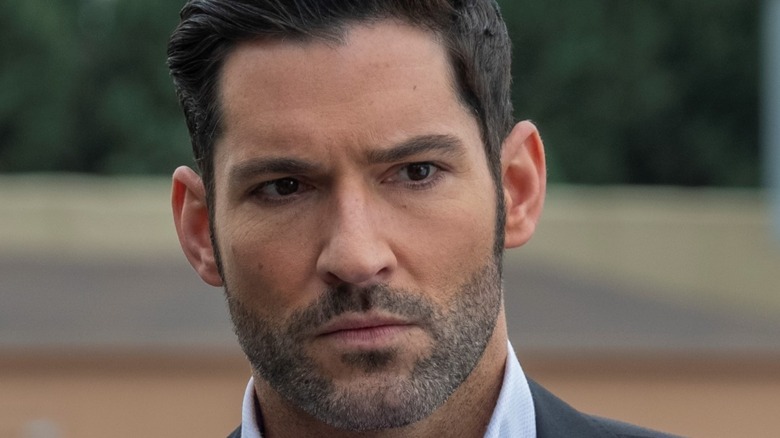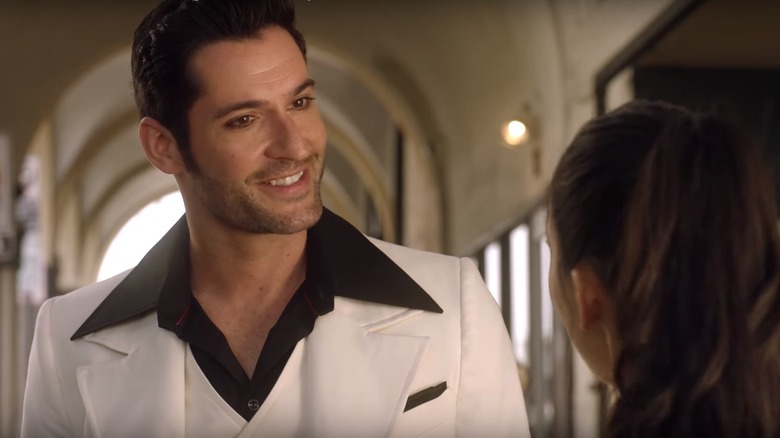The Truth About The Standalone Episodes In Lucifer
While "Lucifer" found a stable home on Netflix to air its final three seasons, Seasons 1-3 were plagued by scheduling changes thanks to Fox. The network bounced the devilish procedural around from timeslot to timeslot, while also adjusting the length of two seasons. All of this understandably led to confusion among the fans.
On the plus side, some of this turbulence actually led to an extra shot of creativity in the series, as "Lucifer" produced four standalone episodes in Season 2. However, the episodes — which included "Mr. and Mrs. Mazikeen Smith" and "City of Angels?" — ended up not airing during Season 2 at all when Fox decided to shorten the season to 18 episodes. Thankfully, co-showrunner Joe Henderson and the rest of the show's production team had a plan.
That plan involved naturally weaving the bonus episodes of "Lucifer" into Season 3. In a 2017 interview with TVLine, Henderson revealed the truth about the standalone episodes of "Lucifer," and why the writers were actually glad they could incorporate them into the third season rather than tack them all on at the end of Season 2.
"We had a really good feeling that these four standalone episodes would be in Season 3, so we started building them with that in mind," Henderson told TVLine. "What these episodes do is begin new story for our characters."
So even though the episodes could be watched in any order, they still connected to the larger character arcs the writers were working to create.
Lucifer's standalone episodes allowed the writers to get a little bit experimental
Television isn't nearly as episodic in nature now as it was a decade ago. There was a time when shows were crafted in such a way that you could drop in and out of them without missing big chunks of the plot. And while some shows still largely operate this way (think the "Law & Order" franchise), even procedurals tend to have an underlying mythology for viewers to follow these days.
In the case of "Lucifer," the writers did an excellent job of balancing the overarching mythology with the cases of the week, but it was rare for the show to actually produce a true standalone episode. That all changed when the extra episodes of Season 2 rolled over to Season 3, and as a result, the writers got a chance to get weird in the best way possible.
"What I love about them is that when we found out we would be doing these, we told Warner Bros. and Fox, 'We're going to go a little crazy on these. We're going to break format a little bit, we're going to screw around a little bit,'" Henderson said. "They're very much still our show, but they're like the episodes of 'The X-Files' that were a little strange, goofy or dark — very much the show, but flexing a very different muscle."
The standalone episodes in Season 3 of Lucifer ended up being rich in character details
Since Henderson and his team had an inkling that the standalone episodes would be rolled over to Season 3, they saw an opportunity to use each outing as a way to not only explore the characters in-depth, but also to launch stories within the new season. For instance, in "Mr. and Mrs. Mazikeen Smith," Maze takes center stage for a story about espionage that doubles as an examination of the demon's capacity for love. That episode ended up feeding into Maze's overall Season 3 arc, which found her questioning whether or not she was truly soulless given how many people she cared about on Earth.
Likewise, "Off the Record" was an exploration of the role Lucifer actually plays in sending humans to Hell. As he tells Linda's ex, humans send themselves to Hell with their guilt, and they're the ones who keep themselves trapped there, not him. In that way, this standalone episode actually holds a huge revelation, at least in terms of Lucifer's complicated relationship with humanity.
It's true that viewers could watch these particular outings in any order and enjoy them. But even though they were crafted to stand on their own, they each contain a wealth of character-rich storytelling, and plenty of fiendish twists. "Lucifer" is a show with rich mythology, and that's part of its appeal, but the standalone episodes that rolled over into Season 3 make an excellent case for writers being allowed to stretch their creative muscles without worrying about advancing the season long arc week in and week out.
Ultimately, even though the standalone episodes were a byproduct of the show's scheduling woes, the end result was four unique outings that fans may never have gotten under more stable circumstances. And given the quality on display, it would have been a shame to see these fascinating episodes left on the cutting room floor.


